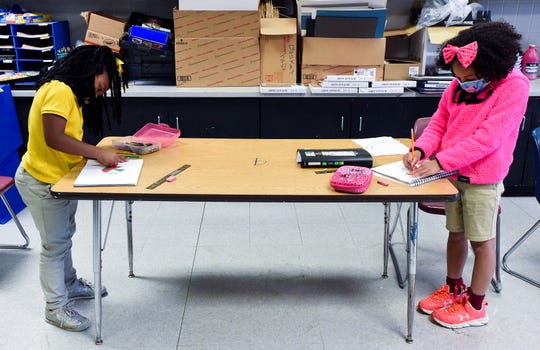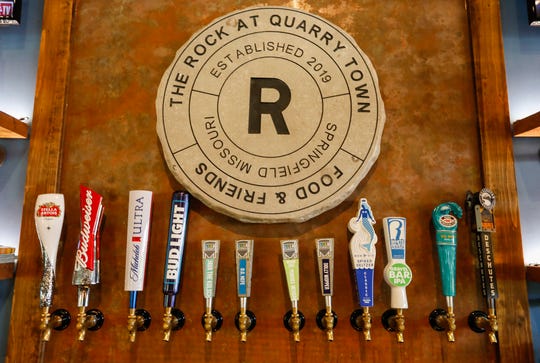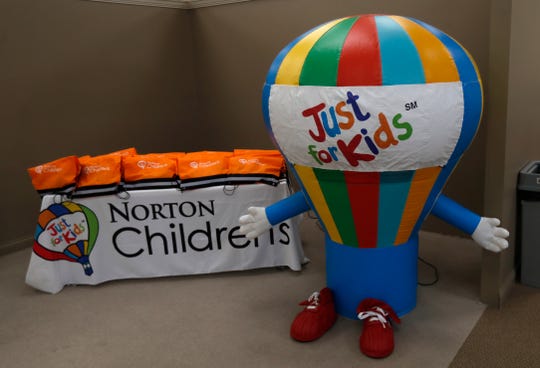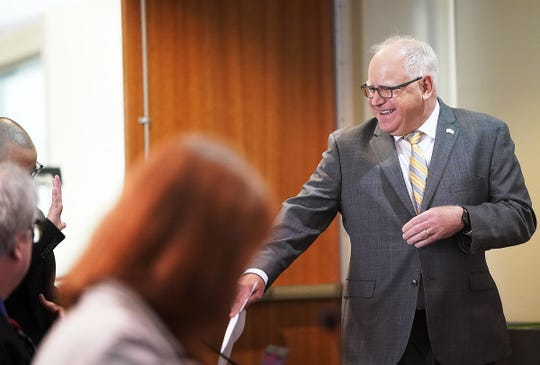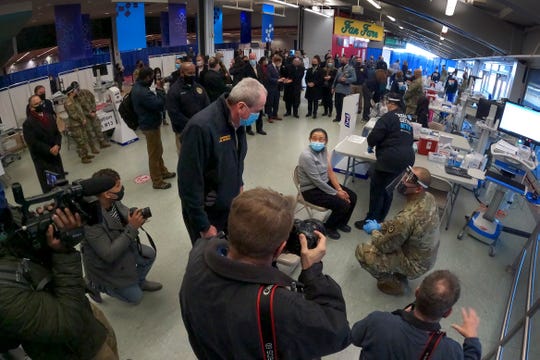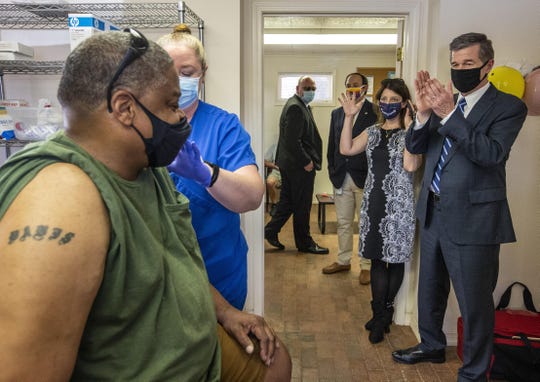Alabama
Audrianna Clay, left, and Gabriella DeLoach social distance as they draw during art class at Carver Elementary Arts Magnet School in Montgomery, Ala., on April 20. (Photo: Mickey Welsh / Advertiser)
Montgomery: Following the most challenging year schools have had to endure, a record number of Montgomery Public Schools students are set to return to classrooms for the district’s Launch into Learning summer program. Starting Monday, more than 12,000 students will show for summer school. That is far higher than previous years’ participation, at about 2,500 students. It also represents the most students who have been in Montgomery’s public schools since the coronavirus pandemic began – with about 7,000 of the district’s 28,000 returning for face-to-face instruction during the past year. The district has hired more than 400 teachers to run the eight-week program and is still hoping to hire more. The district is paying summer school teachers $50 per hour. The program offers lessons for students who need acceleration, intervention or enrichment. “I think children are ready to be back in school, and I think their parents recognize there has been some loss from not being in school this past year,” Board President Clare Weil said about the increase. “This is catch-up, but it is fun catch-up.”
Alaska
Juneau: The city is jumping into the fray of those offering incentives to get COVID-19 shots, with the Greater Juneau Chamber of Commerce chipping in $20 gift cards and a shot at $1,000 for the Healthy Juneau Initiative, the Juneau Empire reports. Residents who get their first vaccine dose between Thursday and June 29 at city clinics or participating pharmacies will automatically get a gift card to be used at a local business and be entered into a $1,000 raffle, according to the newspaper. A city dashboard showed 75.2% of the borough’s eligible population having received at least one COVID-19 shot as of Thursday and 68.5% fully vaccinated.
Arizona
Phoenix: The Arizona Department of Economic Security is still determining how to implement the return-to-work cash bonuses promised to residents by Republican Gov. Doug Ducey last month. Ducey announced May 13 that the bonuses would go to residents who stopped receiving unemployment benefits, returned to work by September and kept their job for at least 10 weeks, ABC15 reports. Full-time workers making less than $25 an hour or $52,000 a year would be eligible for $2,000, and part-time workers would be eligible for $1,000, department officials said. Employees would need to submit pay statements for each week worked and an employer address within Arizona and employer contact information. But ABC15 learned that the state Department of Economic Security must now create an online portal where residents could upload the documentation and has yet to choose a company to create the website. “DES is currently assessing vendors to implement the appropriate system for the Return to Work Bonuses (RTWB) portal,” department spokesperson Tasya Peterson said. The program is scheduled to begin accepting applications July 10.
Arkansas
Little Rock: An attorney’s contract with the state was terminated because he emailed a legislator and criticized her support of a measure banning gender confirming treatments for transgender youth, according to a federal lawsuit filed Wednesday. The American Civil Liberties Union of Arkansas filed the lawsuit on behalf of Casey Copeland, whose contract with the Administrative Office of the Courts was terminated after he emailed a sponsor of the ban enacted earlier this year. The ACLU has filed a lawsuit challenging the ban, which is set to take effect July 28. “Although Copeland spoke out on a matter of public concern covered by both local and national press, defendants decided to punish Copeland in violation of his protected right to engage in core political speech critical of his state legislator by terminating his contract with the state,” the lawsuit said. Copeland’s contract with the state representing children in neglect and dependency cases was terminated two days after he sent the email from his personal account to Republican state Rep. Charlene Fite about the ban. In the March 30 email, Copeland wrote that he was ashamed of her for sponsoring and supporting the legislation. Copeland ran unsuccessfully against Fite in the 2018 election.
California
Characters from the film “Black Panther” perform in the show “The Warriors of Wakanda: The Disciplines of the Dora Milaje” at the Avengers Campus media preview at Disney’s California Adventure Park on Wednesday in Anaheim. (Photo: Chris Pizzello/Invision/AP)
Anaheim: Now that it’s getting safer to assemble, the Avengers are at last descending on Disneyland. A Spider-Man ride that lets visitors blast bots with virtual webs from their bare hands and a show of strength from the royal guard of Wakanda are among the highlights of the new Avengers Campus at Disney’s California Adventure Park, whose debut was paused for about a year by the coronavirus pandemic before it opens to the public Friday. The Avengers Campus seeks to be an immersive experience that allows guests to become super-heroic across a series of rides, shows and eateries from the Marvel Cinematic Universe. The show includes something rare for a day at Disneyland: a moment of silence for the dead. While Okoye, leader of the shaven-headed women of Wakanda, tells the crowd she seeks to honor fallen kings and ancestors, the ritual – in a time of many such moments – feels like an acknowledgment of the many deaths during the pandemic that kept the park dark for more than a year, as well as an acknowledgement of “Black Panther” star Chadwick Boseman, whose death last year stunned the world. Disney’s two Anaheim parks reopened with restrictions April 30 and will reopen at something nearing normal June 15.
Colorado
Denver: The state will give $50,000 scholarships to 25 students who have received COVID-19 vaccinations in another incentive to get as many residents inoculated as possible. Democratic Gov. Jared Polis told a news conference Wednesday that Colorado resident students ages 12 to 17 who have received at least one vaccine dose are eligible. The Denver Post reports that those chosen in random drawings starting next Monday will receive the money in CollegeInvest funds that generate interest. They can use their scholarships at the postsecondary educational institution of their choice, including colleges and technical, occupational and credential programs both inside and outside Colorado. Five winners will be chosen each week through July 9. No one has to register for the drawings, and residents can check their vaccination records on the Colorado Immunization Information System database. Polis previously unveiled a lottery to reward a total of five vaccinated residents $1 million each to promote COVID-19 vaccinations. The first drawing is Friday. Money for the scholarship and lottery programs comes from federal coronavirus relief funds.
Connecticut
Hartford: Despite a strong push from progressive Democrats and their allies, it appears unlikely some proposed tax increases on the wealthy will appear in any final budget deal with Gov. Ned Lamont, House Speaker Matt Ritter said Wednesday. Lamont, a Democrat and a former businessman, has been publicly opposed to a new “consumption tax” and capital gains tax on higher-income taxpayers, as well as some other tax increases proponents say are needed to fill revenue gaps after the state’s share of federal COVID-19 relief funds run out and to address long-standing inequities. Lamont has argued it’s not the time to raise taxes as Connecticut emerges from the pandemic. “The governor has not moved his position on capital gains or anything like that. And we are at June 2, and the House wants to run a budget on Saturday,” Ritter, a Democrat, told reporters Wednesday morning. “So I think it’s fair to say that we made that concession to him, and we’re hoping he’s willing to make some concessions to us on the spending side.” This year’s session of the General Assembly is scheduled to adjourn June 9. Ritter has made it clear he thinks lawmakers must pass a new two-year budget before they leave for the summer break.
Delaware
The Garden Remembrance Memorial at the Presbyterian Church of Dover honors those in Delaware who lost their lives to COVID-19. (Photo: Amanda Parrish, Delaware Online)
Dover: Colorful tubes stacked high on the front lawn of the Presbyterian Church of Dover light up at night, along with six figurines of people praying, dancing and celebrating, in a display that aims to give Delawareans a place to mourn, pray and remember those who have died due to COVID-19 in the state. David Denny, treasurer of the church, said the illuminated Garden Remembrance Memorial is supposed to look like a bar graph, showing how many people have died during the pandemic. Each stack represents a month, with its color representing the correlating birthstone, and each tube represents one person who died from the coronavirus. The Delaware Division of Public Health said COVID-19 has claimed more than 1,600 lives in the state since the first documented case in March 2020. Originally, the bar graphs were meant to stay in the basement of the church, but when one of them got to be nearly 10 feet tall, the memorial had to be moved outside. Two of the figures are praying for the COVID-19 victims, and another is dancing, symbolizing that there will be joy at the end of the pandemic. A group of three cheering with their arms in the air represents a family getting to see one another again. People can write a note and put it inside a tube to recall the names of those who died.
District of Columbia
Washington: Metro customers who need to get to work or home late at night will now have more options. Starting Sunday, Metrobus will extend its late-night service on dozens of bus lines throughout D.C., Maryland and Virginia, WUSA-TV reports. Buses on 36 of Metro’s busiest routes will operate until 2 a.m. seven days a week – ultimately providing a vital link for those who rely on public transportation. The return of late-night bus service coincides with the DMV area’s pandemic recovery as COVID-19 restrictions are lifted and as the region prepares to fully reopen. In addition, Metro officials said they will add more frequent service and restore more routes as part of service improvements to more than 60 routes. The service changes will increase Metrobus service to approximately 85% of pre-pandemic levels. News of Metrobus’ extended services comes as Metro’s Board of Directors are in talks of considering additional service improvements and fare changes as riders return to bus and rail this summer and fall. Back in May, Metrobus ridership reached the highest levels since the pandemic began, officials report. Weekday bus ridership is now up to 50% of pre-pandemic levels.
Florida
Tallahassee: Republican Gov. Ron DeSantis signed a $101.5 billion budget Wednesday after vetoing $1.5 billion, including $1 billion in federal money for an emergency response fund he said had strings attached that made it unusable. DeSantis held a bill signing ceremony at a New Smyrna Beach restaurant and used the event to boast about his response to the coronavirus pandemic, saying fully opening Florida to business early helped the economy rebound faster and stronger than expected. “A lot of people were trying to tell me to close restaurants like this last summer. We didn’t do it. We kept business open. We got kids in school,” DeSantis said. “The result was our economy really started to rebound.” Even with the vetoes, the budget is more than $9 billion above the current state spending plan. The budget year starts July 1. DeSantis also vetoed $350 million in federal relief money that was to be put in the state’s rainy day fund for future emergencies. DeSantis said the state continues to far exceed revenue projections, helped in part by tourism: “You had a lot of these other states that just kept locking people down. We were the state lifting people up. That was good for Floridians, but we were also the landing spot for a lot of people that wanted to escape the insanity and come and get recharged,”
Georgia
Augusta: Local businessman T.R. Reddy was reading a magazine story about a study on long-term symptoms of COVID-19 at Medical College of Georgia at Augusta University and noticed that its funding was nearly up, prompting him to see if he could help. With contributions from businessman Ronnie Powell and his family and University System of Georgia Regent Jim Hull of Augusta, the T.R. Reddy Family Foundation presented the study leaders with a check for $300,000. The COVID-19 Neurological and Molecular Prospective Cohort Study in Georgia, or CONGA, is following people in the area who were infected with the coronavirus and checking them for lingering symptoms and problems. It was initially funded with a $200,000 grant from the National Institutes of Health for its first year, said MCG Dean David Hess, a co-principal investigator on the study. Researchers have applied to NIH to fund the next four years but are still waiting to hear back, he said. The new funding “has enabled us to not lose a step,” Hess said, and will allow the study to recruit twice as many patients. That would make it one of the largest in the country following people with long-term COVID-19 symptoms, said Dr. Elizabeth Rutkowski, who is also co-principal investigator. In the MCG study, half the participants are Black, compared to 5%-10% in other studies, which is critical because of the toll the pandemic has taken on those patients, she said.
Hawaii
Honolulu: The state has been turning down federal vaccine shipments as demand wanes, Hawaii News Now reports. The Department of Health accepted less than 40% of doses available from the federal government this week and hasn’t taken its full allocation in more than two weeks, according to the news outlet. Most of the accepted doses have gone to Oahu, with other islands not placing any vaccine orders.
Idaho
Coeur d’Alene: Coronavirus test positivity rates are spiking in northern Idaho, with the Panhandle Health District saying the rate hit 8.4% over Memorial Day weekend, the Coeur d’Alene Press reports. That’s the highest rate in the state and the region’s worst since early February, according to the newspaper. The state’s overall positivity rate was 5% as of Tuesday. Making matters worse for northern Idaho, its rate of residents vaccinated against COVID-19 “is considerably lower than anywhere else” in the Gem State, health district public information officer Katherine Hoyer told the Press.
Illinois
A free beer will be on tap at select bars for Illinoisans who get a COVID-19 shot. (Photo: Andrew Jansen/Springfield News-Leader)
Springfield: Get the shot, then relax with a shot or a beer. That’s the incentive for people to get vaccinated against COVID-19 under legislation Gov. J.B. Pritzker signed Wednesday. The Democrat’s action came on the same day President Joe Biden announced a “month of action” – including beer, sports tickets and other lures – to get people in line for the needle and meet his goal of having 70% of Americans vaccinated by July 4. “Not only will the vaccine protect you from getting sick – your free COVID-19 shot can now get you a free shot of your choosing or whatever drink suits your palate,” Pritzker said in a statement. The Illinois plan, sponsored by Rep. Mike Zalewski of Riverside and Sen. Sara Feigenholtz of Chicago, both Democrats, intends to draw customers back to the bar by offering a free drink with proof of vaccination. It also extends the pandemic-era law that allows the sale of cocktails for pickup or delivery, which helped liquor sellers through the crisis that closed many business doors. “Any tool we can provide to help keep this vibrant industry going while they are rebuilding is critical,” Feigenholtz said. Health care providers in the state have administered 11,338,305 vaccine shots, which include first and second doses. The seven-day rolling average of vaccines administered daily is 41,234 doses.
Indiana
Indianapolis: The state’s largest hospital system, Indiana University Health, will require all its doctors, nurses and other employees to be fully vaccinated against COVID-19 by Sept. 1. IU Health announced the policy Tuesday in a statement that said vaccines are a safe, effective way to protect patients and help reduce the spread of the coronavirus. The health system added that it has required the flu vaccine since 2012, along with several other inoculations, as a condition of employment. In 2013, IU Health fired eight employees, including three nurses, for refusing to get a flu vaccination, the Indianapolis Business Journal reports. IU Health said employees will be allowed to apply for a deferral or exemption from the COVID-19 vaccine based on medical or religious reasons, and those applications will be reviewed on an individual basis. The COVID-19 shot requirement will affect more than 3,000 doctors and 31,585 other employees, from administrators and billing clerks to therapists and nurses’ aides, who work in IU Health’s 15 hospitals and dozens of outpatient clinics. IU Health said weeks ago that it was only recommending, not requiring, that employees get a COVID-19 vaccination but said it was continuing to review the policy.
Iowa
Des Moines: The state’s Democratic auditor accused the Republican governor Thursday of violating a 2018 state law that prohibits statewide elected officials from using public funds for self-promotion, arguing she broke the law by making ads promoting coronavirus public safety measures. Auditor Rob Sand said an ad campaign launched by Gov. Kim Reynolds in November that was designed to slow the spread of the virus violated the law because it featured Reynolds, who used more than $500,000 of federal pandemic relief funding for the ads. Sand said his office conducted an investigation of the ad campaign that was funded with money that was intended to pay for expanded testing capacity for the virus and improved collection and reporting of data about the pandemic. Sand said Reynolds’ office didn’t seek federal approval to spend the money on an ad campaign until after it was announced and five weeks after his office requested invoices for the spending. He said emails show the state got approval for use of the funds in February. In a statement, Reynolds denied she violated the law, saying it clearly provides an exception for when a governor proclaims a disaster emergency. Such a proclamation was in effect for the pandemic at the time.
Kansas
Topeka: Following a year of sports cancellations due to safety concerns stemming from the COVID-19 pandemic, the owner of a local car dealership is giving back to ensure area youths have successful seasons ahead. Brad Lewis, owner of Lewis Toyota of Topeka, said the dealership is donating $25,000 to create a fund that would provide grants to area athletes who want to play but may need help with such costs as tournament-entrance fees and purchasing equipment. “With the vaccinations and cities and states opening up, hopefully this is a full summer of sports for the youth,” Lewis said. “We want to make sure that we can reach as many kids as possible and let these kids participate.” He said Lewis Toyota is donating that $25,000 to the Greater Topeka Partnership, which will work with the dealership to disseminate the funds. The money is expected to be dispersed as local youths, families or teams apply for it. Lewis said those looking to benefit from the funds will need to apply in person or online at the dealership’s website. “The last year, these kids have dealt with a lot of uncertainty, and I feel like getting kids out to participate, getting them out in the fresh air, getting them out competing and building friendships with other team members will be a good experience for them,” Lewis said.
Kentucky
Norton Children’s is vaccinating children 12 and up and studying Pfizer's COVID-19 shot in kids as young as 6 months old. (Photo: Scott Utterback/Courier Journal )
Louisville: Local researchers announced Wednesday that they will study the Pfizer vaccine in children 6 months to 11 years old as part of a larger trial that seeks to expand eligibility. The Norton Children’s Research Institute, affiliated with the U of L School of Medicine, will look at the safety of the COVID-19 vaccine in children and how their bodies respond to it. Norton plans to enroll its first patients in the next week or two. “Having a safe and effective vaccine for children will not only keep them healthy but also would facilitate a return to normal in terms of school and other activities,” said Dr. Gary Marshall, the chief of pediatric infectious diseases at Norton Children’s and the U of L School of Medicine, who will lead the trial investigation. Parents will need to monitor their child’s health. Research participants will have no fewer than six in-person visits across two years, and during some of those, Norton said, blood will be drawn to look at immune response. The second year of the study primarily involves seeing if the participants get sick, Marshall said. Researchers need 100 local participants, any child in the age range who is “generally healthy.” Participants will be compensated. Vaccine side effects can include fever and soreness, which Marshall said can translate to “fussiness” or “irritability” in young children.
Louisiana
Lafayette: Summer school is starting for the Lafayette Parish School System, and students attending in person do not have to wear masks after a school board vote Wednesday night. Students in third grade and up were required to wear masks on campus through the past school year, but Gov. John Bel Edwards removed his statewide mask mandate in April and lifted the school requirement May 25, leaving the decision to the discretion of local school systems. The Lafayette Parish School Board voted to remove the mask mandate on school campuses effective immediately, affecting high schoolers who began summer school Thursday and K-8 students who start next week. Masks are still required on school buses, as the decision applies only to school facilities.
Maine
Portland: A much higher percentage of older residents have gotten their COVID-19 shots, but younger residents are starting to catch up. About 72% of Mainers 40 and up have had their final dose of a vaccine, the office of Democratic Gov. Janet Mills reported Wednesday. The rate for residents who are younger than 40 but eligible for a vaccine is about 38%. Older residents have a higher rate of vaccination in part because some age groups became eligible for the vaccine sooner. There is also no vaccine yet available for people younger than 12, and 12- to 15-year-old children only became eligible recently. The state as a whole has a vaccination rate of about 52%, which is one of the highest in the country. Officials with the Maine Center for Disease Control have said they are seeing steady progress in getting vaccines to younger residents. “The virus is on the run but not yet out of sight,” Maine CDC Director Dr. Nirav Shah said.
Maryland
Hagerstown: The state Department of Health is closing its mass vaccination site at Hagerstown Premium Outlets after Friday, moving it temporarily to a Meritus Health site before it phases out. The mass vaccination site is moving to Meritus Health’s Robinwood Professional Center, where the health care provider already has a vaccination site set up, Meritus spokeswoman Joelle Butler confirmed. The mass site will operate there from Monday through June 19 before Meritus reverts back to its regular vaccination clinic hours, Butler wrote in an email. During that two-week period, the Robinwood atrium will be open for vaccines from 8:30 a.m. to 5 p.m. on Mondays, Tuesdays, Thursdays and Fridays and from 8:30 a.m. to 8 p.m. on Wednesdays. Anyone 12 or older can walk in during Robinwood clinic hours for vaccines, Butler wrote. A signed consent form is required for those ages 12 to 17.
Massachusetts
Boston: Getting a COVID-19 shot could save residents a few dollars off their grocery bills, Gov. Charlie Baker announced Wednesday. Starting Thursday, shoppers who get their vaccine at clinics set up outside one of a select few Market Basket supermarkets in the state will get a $25 store gift card, the Republican governor said at a news conference in Chelsea. “We know these are convenient community locations. They’re very heavily traveled, as anybody who’s ever been to one knows,” Baker said. “We encourage all residents to come down and get their vaccine while they’re doing their shopping.” The mobile vaccine clinics will be set up at Market Basket stores in Chelsea, Fall River, Lawrence, Lynn and Revere, some of the communities that suffered most during the pandemic. No appointments are necessary. Shots will be available Thursday, Friday and Saturday and again June 10-12. Massachusetts has fully vaccinated almost 3.7 million people, but Baker said there is “still a lot more work to do” to overcome hesitancy and get vaccines to hard-to-reach populations. “Get vaccinated to protect yourself. Get vaccinated to protect your friends. Get vaccinated to protect your family. Get vaccinated to protect your neighbors and your communities,” the governor said.
Michigan
Lansing: Republicans alongside a handful of Democrats in the state House passed a bill Wednesday that would ban government-required COVID-19 vaccine passports, even though they do not exist, and no legislative effort is being made to utilize them. The measure, if approved by the Senate and signed by Gov. Gretchen Whitmer, would ban vaccine passports or any other system in which individuals’ civil rights are diminished by their COVID-19 vaccination status, according to the bill’s wording. Whitmer spokesman Bobby Leddy said instead of collaborating on methods to promote vaccines and save lives, Republicans are wasting time trying to ban something that doesn’t exist. “The state has been very clear that we’re not currently exploring a vaccine passport concept, nor has there been any discussion about mandating vaccines,” Leddy said. Supporters of the bill say they are concerned that one day the governor may look at vaccine mandates. The bill would prevent any governmental body from tracking vaccination statuses and requiring proof of inoculation, including public schools and colleges, government buildings and meetings, and any other governmental entity.
Minnesota
A maskless Minnesota Gov. Tim Walz smiles as he arrives for a press conference May 17 in St. Paul to announce he and the Legislature had agreed to spend $52 billion on the next two-year budget. (Photo: David Joles/Star Tribune via AP)
Minneapolis: Republican legislative leaders made a fresh push Wednesday for ending Democratic Gov. Tim Walz’s reliance on emergency powers to manage the COVID-19 pandemic, while state health officials reported continued progress on vaccinations and other key measures. Rep. Barb Haley, of Red Wing, and Sen. Jeff Howe, of Rockville, touted a bill that they said would preserve Walz’s ability to procure and distribute vaccines and to obtain federal aid, while restoring the normal balance of power between the governor and Legislature. But the two lawmakers – joined by Senate Majority Leader Paul Gazelka, of East Gull Lake, and House Minority Leader Kurt Daudt, of Crown – said they got a cold reception late last week when they presented Walz with their proposal, which they said is based on Alaska’s “off-ramp” for ending its emergency declaration. “I counted up the days this morning – it’s been nearly 500 days,” Haley told reporters. Walz spokesman Teddy Tschann said the governor is committed to working with lawmakers, but the plan has serious holes. “It would slow down vaccination, jeopardize hundreds of millions of dollars in hunger relief, and end the eviction moratorium overnight with no plan to provide an off ramp for renters or landlords as we come out of the pandemic,” Tschann said in a statement.
Mississippi
Jackson: The state had administered about 1.89 million COVID-19 shots as of Thursday for an overall vaccination rate of 28%, far behind the nation’s average of 41%. For months, Mississippi health officials have vehemently backed vaccinations against COVID-19. During a May 28 meeting, State Epidemiologist Paul Byers said even if a person has already had the coronavirus, vaccination is still a key step to building increased immunity. The Mississippi State Department of Health reported 192 new cases and two coronavirus-related deaths Thursday. Since the virus hit the state in March 2020, a total of 318,048 cases and 7,324 coronavirus-related deaths have been reported. The health department on Thursday reported 17 outbreaks at Mississippi nursing homes. There have been 10,481 cases of the coronavirus in long-term care facilities and 1,982 deaths reported. Residents between the ages of 25 and 39 represent the largest portion of the infected population in the state, with 70,724 cases reported Wednesday, the latest figure available. Among patients under 18, children between the ages of 11 and 17 have the highest infection rate, with 24,677 cases identified. The 65-and-older age group has the highest total number of known deaths with 5,586.
Missouri
Springfield: Optimism after a time of sorrow prompted by COVID-19, America’s legacy of systemic racism, and violence against law enforcement were key themes in Mayor Ken McClure’s 2021 State of the City address Thursday morning. The state of the city is “strong” in 2021, as McClure said it was during last year’s speech. Republican U.S. Sen. Roy Blunt was in town for the event, extolling the speed at which the U.S. developed COVID-19 vaccines; expressing support for expanding eligibility for college Pell Grants; and praising Springfield’s mayor. McClure previously served as chief of staff for the senator’s son, former GOP Missouri Gov. Matt Blunt, and long before that, he was the younger Blunt’s Sunday school teacher. During his speech, McClure repeated many talking points delivered recently, thanking various sectors of the community for pitching in to respond to the pandemic, which the mayor called “the most significant global public health emergency to affect human society in the last 100 years.” He specifically mentioned local colleges and universities, nonprofits, police and fire departments, public health and health care provider systems, the chamber of commerce and local businesses, along with religious communities and government leaders, for their efforts over the past year.
Montana
The Indian Education for All department this year awarded 49 Indigenous high school graduates eagle feathers to mark their achievement. (Photo: Courtesy of Dugan Coburn, Indian Education for All)
Great Falls: The Indian Education for All department this year awarded 49 Indigenous high school graduates in the city with eagle feathers, symbolizing their achievement and connection to culture. The department awards the feathers each year in a ceremony, but this year, with COVID-19 restrictions, the department held five separate ceremonies to distribute the feathers. “It’s a mark of achievement for students in the Native American community and a recognition of them as warriors. It’s a great opportunity for them to be recognized within the community,” said Dugan Coburn, director of Indian education at Great Falls Public Schools. Many Plains tribes consider bald and golden eagles sacred. “The bald eagle flies over big storms, so it’s a symbol to stay out of trouble. To take the high road when things are going wrong,” Coburn said. “The golden eagle flies so high, it seems like it disappears. The oral history is that the Creator burned clouds into its feathers, so prayers spoken to the feathers have a direct line to the Creator.” Students can pray with the feathers when they need support and thank the feathers when grateful. Coburn encourages students not to hang feathers on their rearview mirror, where they could be stolen or devalued.
Nebraska
Lincoln: Some lawmakers and child advocates are raising concerns about the state’s practice of seizing Social Security payments to foster children to pay for their care, while Nebraska officials defend the practice as legal. Since 2009, the state has paid a Virginia firm to research which of the state’s 4,000 foster children might be eligible for Social Security, either due to a physical or mental disability or to the death of a parent, and then go after those benefits, the Omaha World-Herald reports. The state pays Maximus Health Services about $300,000 a year for the service. The effort reaped about $2.7 million in benefits a year in the past three years. The usurped benefits are used to reimburse state expenses for foster care. State Sen. Megan Hunt, of Omaha, said she was shocked to learn that foster children weren’t being informed that their Social Security benefits were being used by the state. She has scheduled a study of the issue for the months before the next legislative session, and Nebraska Appleseed, which advocates for children and the poor, is supporting her move. Garret Swanson, a spokesman for the Nebraska Department of Health and Human Services, said the practice is permitted under federal and state law, and foster children aren’t informed of their benefits being taken because they’re minors.
Nevada
Carson City: Gov. Steve Sisolak said he’s proud of what lawmakers accomplished during the legislative session that ended this week and believes policies to fuel economic growth, boost funding for schools and fix outdated infrastructure will set the state on a path toward recovery from the coronavirus pandemic. “With what’s ahead for the state, I’m really optimistic compared to the day I started the session back in February,” he told reporters during an interview Tuesday in his Carson City office. After a year that forced discussions with staff about a potential shortage of body bags and the impact of increased cremations on air quality, Sisolak said he hopes to parlay pandemic recovery efforts into long-term economic development. The governor contrasted the actions taken by the Democratic-controlled Legislature with policies Republican counterparts in Florida and Texas are pushing. In Texas, lawmakers backed by Gov. Greg Abbott are trying to pass an election policy bill to limit drive-thru voting, polling place hours and voting by mail. In Florida, Gov. Ron DeSantis signed a bill barring transgender student-athletes from competing on girls’ sports teams in public schools. “We got more election access passed. We improved LGBTQ rights in the state of Nevada,” Sisolak said.
New Hampshire
Concord: Building on feedback from last year, the New Hampshire Department of Education is once again asking parents, educators and community members to take a survey on how schools responded to the coronavirus pandemic. Last spring, a survey of remote instruction and the return to school generated more than 56,000 responses, helping to shape the state’s K-12 Back to School Guidance. Education Commissioner Frank Edelblut said the current survey will “provide valuable information for schools that are already crafting plans for fall instructional programs.” People can respond to the survey online through June 30. Available links are for families in K-12, preschool and private schools at bit.ly/nhdoefamily; staff in public and private schools at bit.ly/nhdoestaff; and community members at bit.ly/nhdoecommunity.
New Jersey
New Jersey Gov. Phil Murphy visits the Bergen County Meadowlands vaccination mega-site Jan. 29. (Photo: Pool/NorthJersey.com)
Trenton: The state will be shutting down its six mass COVID-19 vaccination sites amid a move from a mega-site model to relying on about 1,800 community inoculation sites, Gov. Phil Murphy said Wednesday. New Jersey opened the six large sites early on in the vaccination effort and has inoculated more than 950,000 people at those locations, but Murphy, a Democrat, said it’s time to shift away from that model given that the state has nearly 2,000 other places where people can get shots. The large sites are located in Atlantic, Bergen, Burlington, Gloucester, Middlesex and Morris counties. Atlantic and Gloucester have already given their final first shots to people. The final second doses will be given throughout June and July, depending on the site. So far the state has more than 4.2 million fully vaccinated residents. Murphy has set a goal of getting 4.7 million adults – or 70% – vaccinated by June 30.
New Mexico
Santa Fe: Gov. Michelle Lujan Grisham on Wednesday issued a new public health order that places each of the state’s 33 counties in the least restrictive category for pandemic-related mandates. While state officials pointed to the decreased risk of COVID-19 transmission statewide, Lujan Grisham’s administration acknowledged that five rural counties would have slipped back into the more restrictive yellow category within the state’s color-coded risk system had it not been for the new health order. The governor has set a goal of ending the color-coded system at the end of June, as long as 60% of residents are fully vaccinated by then. “We’re almost there,” she said in a statement, suggesting that more inoculations would pave the way for small businesses and the economy to “roar back to life.” Vaccination rates in De Baca, Guadalupe, Harding, Roosevelt and Torrance counties have lagged, as many residents don’t want to get shots. With the pace of vaccination registration slowing overall, the state on Tuesday rolled out a new effort that uses cash to get more people in line. New Mexico is offering the largest single cash prize – $5 million – among a growing number of states staging lotteries to promote inoculations. According to the latest state data, about 56% of eligible residents are fully vaccinated.
New York
Albany: Taxpayers are set to foot the bill for a $2.5 million contract for lawyers representing Gov. Andrew Cuomo’s office in an ongoing federal investigation over his administration’s handling of COVID-19 data in nursing homes, the governor said Wednesday. Legal bills are mounting as Cuomo and his administration fight back allegations that he abused his power by sexually harassing and assaulting female employees and other women, publishing his COVID-19 leadership book in violation of state ethics laws, providing priority coronavirus tests to his family in spring 2020 and minimizing the state’s tally of COVID-19 deaths among nursing home residents. The Department of Justice and state Attorney General’s office have launched probes of such allegations, while a separate investigation by the Assembly’s judiciary committee is considering whether there are grounds to impeach Cuomo. When asked Wednesday if he is using campaign or personal funds to pay for any lawyers, Cuomo said: “Not at this time.” It’s unknown how much taxpayers will end up paying in all for legal costs stemming from wide-ranging allegations against Cuomo.
North Carolina
Dr. Mandy Cohen and North Carolina Gov. Roy Cooper, right, applaud after Pine Hall Brick employee Mark Davis receives a COVID-19 vaccination at the Pine Hall Brick plant clinic in Madison, N.C., on May 27. (Photo: Woody Marshall/News & Record via AP)
Raleigh: Gov. Roy Cooper said Wednesday that the state is nearing an announcement on further financial incentives to boost COVID-19 vaccine participation. A rollout would likely come on the heels of a new pilot program set to end next week in four counties. Unvaccinated people can receive $25 cash cards at select locations in Mecklenburg, Guilford, Rowan and Rockingham counties while supplies last. Drivers who take others to get their first COVID-19 shot are also eligible for the $25 reward. “We’re continuing to look at ways to incentivize people to get vaccinations, and we’ve looked very closely at the drawings and other promotions that other states have done and have looked at their results, and hopefully we will be following some of their lead soon,” Cooper said. The Democratic governor hinted at the idea of financial perks during a March 23 news conference, though he noted he’d begin considering them as supply started to outpace demand. Vaccine distribution has stalled in North Carolina over the past month, and the state is near the bottom of the pack in the nation in its share of vaccinated adults. North Carolina ranks as the 14th worst state in COVID-19 vaccine doses administered per capita, according to data from the U.S. Centers for Disease Control and Prevention.
North Dakota
Bismarck: Despite the COVID-19 pandemic, the University of Mary is once again at the very top of all nursing schools across the nation. Nursing’s national benchmarking service, Mountain Measurements, ranked University of Mary’s program No. 1 in America. The yearly report is based on the April 2020 through March 2021 Bachelor’s of Science in Nursing graduates who took the National Council Licensure Examination for Registered Nurses exam. Every member of the University of Mary graduating class who took the licensure exam for the first time passed. The University of Mary’s prestigious nursing program has developed a trend of consistently being at or near the top every year.
Ohio
Jonathan Carlyle of Toledo won $1 million in the state's second Vax-a-Million drawing. (Photo: Provided)
Columbus: A winner of the state’s Vax-a-Million promotion says the possibility of a big prize was what motivated him to stop procrastinating and get his COVID-19 shot. Jonathan Carlyle, 40, of Toledo, knew the importance of getting a vaccine. His sister and her husband had contracted COVID-19, and her father-in-law died from it. “She was on me a lot to go and get the vaccination, and that played a very significant role in getting it,” Carlyle said Thursday. But life intervened. Carlyle and his girlfriend are raising three children, and he works as a delivery driver for Amazon, which can mean long days. “I was working all the time, and I just kept putting it off and off and off, but I knew I needed to get it, and I wanted to get it,” he said. “When y’all announced the Vax-a-Million, as soon as I heard that, I was like, ‘Yes, I need to go do this now.’ ” Two days later, he got the Johnson & Johnson shot, and it paid off big: Carlyle won $1 million in the state’s second Vax-a-Million drawing Wednesday night. Carlyle said he had finished a long shift when he received a call that went to voicemail from Gov. Mike DeWine. “I pretty much almost lost it inside the van,” Carlyle said. He hopes to use the prize money to buy a “forever home” for his family and ease some of the financial pressure of raising children.
Oklahoma
Oklahoma City: Residents may get texts beginning this week from the state Health Department with information about COVID-19 vaccinations. The department is launching a statewide texting campaign to reach people with details about how to find an appointment near them. The state Health Department said the texts will be sent to residents ages 18 to 54 in areas, largely rural, with lower vaccination rates. About 33.8% of the state’s population is fully vaccinated, and 41.6% of residents have received at least one dose. Among only the state’s adults, 53.6% have had at least one dose, and 44% are fully vaccinated. Vaccination rates aren’t uniform across the state. For example, Caddo and Noble counties have among the state’s highest percentages of fully vaccinated adult residents, 53% and 50.3%, respectively, according to CDC data. Osage County, by comparison, has about 23.5% of its adult residents fully vaccinated. The texts will come from real people on behalf of the Oklahoma Health Department. Keith Reed, the state’s deputy commissioner of health, said the texts aren’t a scam, and they won’t ask for personal information or money. For those who have already been vaccinated or don’t want to receive the texts, there will be an option to opt out.
Oregon
Eugene: After the University of Oregon announced early last month that it will require a COVID-19 vaccine for students and employees on campus this coming fall, the majority of campus workers say they’re supportive of the mandate, according to employee unions. The groups still need to work with the university to accommodate philosophical or medical concerns of some members, as the vaccine requirement is technically a change in working conditions, the unions say. “The response from a good 90% of our membership was that they were OK with it,” said Stephanie Prentiss, president of UO’s union representing classified employees. “They understood that getting vaccinated and keeping campus running is important. We did have a response from another group of our members who … they don’t want to be forced. It’s their right. They have the right to do what they want with their bodies.” The response from the UO faculty is similar, said Chris Sinclair, president of the United Academics union at UO. “The faculty in general are quite supportive of the vaccine mandate,” he said. “There are a lot of different voices and opinions in our ranks, so I would not say that that is 100% in lockstep. But by and large, what we’re hearing from our membership is the support for the mandatory vaccine at the university.”
Pennsylvania
Doylestown: Followed by a roar of applause from Bucks County parents and stakeholders, the Central Bucks Board of School Directors voted 4-3 on Wednesday to make masks optional for the final week of the school year. The board held a nearly 31/2-hour special meeting after the mask mandate attestation expired Monday. Bucks County Health Department Director Dr. David Damsker said the mandate, which had been in place since last year and reissued around Thanksgiving, had “made a lot of sense” during a period when Bucks County was averaging 500 to 600 coronavirus cases per day. “We’ve had people that are vaccinated now, we’ve had people that have had COVID, and those two things along with the warmer weather have clearly made our numbers such that it’s not a really big issue in Bucks County anymore,” he said. In a recent four-day period, the 650,000-population county saw about 14 cases per day, and over the past week, Bucks County schools had about three cases daily among its 105,000 students and staff. Evidence has shown, he said, that there’s a lower risk of COVID-19 infection in children under age 12. For families of children with health conditions, Damsker said the risk of the virus is currently “exceedingly low” in Bucks County schools.
Rhode Island
The Eaton Street side of the Providence College campus. (Photo: David DelPoio/The Providence Journal, file)
Providence: Providence College will mandate COVID-19 vaccines for full-time undergraduate and graduate students returning to campus in the fall. The decision was made after “weeks weighing various considerations,” the Roman Catholic college’s president, the Rev. Kenneth Sicard, said in a statement to the campus community. State health officials, the school’s faculty and staff with the relevant expertise, leaders of other colleges, parents and students had input in the process, he said. “We made this decision by returning to the core principles that have guided our decision-making since the pandemic began more than a year ago,” he said. ”Our first imperative is to protect the health and safety of all those in our community, closely followed by our commitment to providing – to the greatest extent possible – the full academic and community Providence College experience to our students.” The school will consider exemption requests based on medical or religious grounds, he said. The University of Rhode Island, Brown University and Roger Williams University are among the other schools in the state that have already announced similar mandates.
South Carolina
Columbia: The spending plan heading to the South Carolina House floor next week offers state employees a 3% raise and teachers a $1,000 bump in pay. The House Ways and Means Committee on Wednesday approved a nearly $11 billion state budget for the fiscal year that starts July 1. The plan includes money the state didn’t spend this budget year because lawmakers feared a more serious economic downturn in the COVID-19 pandemic. One issue the committee decided was best taken up next week by the whole House was a proposal to provide big lottery prizes to people who get a COVID-19 vaccine, based on programs in Ohio and other states. Only about 34% of South Carolina’s population is vaccinated, well below the 41% rate nationwide and in the bottom 10 in the country. “People in South Carolina love the lottery. We’ve got to get people vaccinated. We’ve got to reach the younger population. We’ve got to reach those people that currently have some hesitancy. The thought of winning a million dollars could overcome that hesitancy,” House Minority Leader Todd Rutherford said. The Columbia Democrat suggested setting aside $2 million for an outreach program and prizes. But after being told the proposal was confusing as written, he offered to wait and put the amendment up next week.
South Dakota
Employees walk into work March 24 at the Smithfield Foods plant in Sioux Falls, S.D. (Photo: Erin Bormett / Argus Leader)
Sioux Falls: Workers at a meatpacking plant that became a coronavirus hot spot last year are considering a strike after contract negotiations with Smithfield Foods stalled, a union said Wednesday. The Sioux Falls chapter of the United Food and Commercial Workers Union threatened to move for a walkout and work stoppage if the Virginia-based company does not resume negotiations on a new four-year contract. The dispute has centered on the wages for meatpacking employees, health care costs and break times. The union said workers have risked their health and lives throughout the pandemic, arguing the company should do more for its employees. The plant became an early indicator of just how vulnerable meatpacking plants were to the pandemic when a surge of infections surfaced among workers in April last year. Four plant workers died from COVID-19, and nearly 1,300 were infected. The Occupational Safety and Health Administration cited Smithfield Foods for failing to protect employees from exposure to the coronavirus at the plant. “It is stunning that Smithfield still refuses to work together with UFCW Local 304A to reach an agreement that recognizes the incredible service of these dedicated South Dakotan workers,” local union President B.J. Motley said in a statement.
Tennessee
Nashville: A state panel is proposing another $44.6 million in federal COVID-19 relief aid to increase the payouts businesses can receive for losses due to the pandemic. The proposal announced at a meeting Wednesday of the state’s Financial Accountability Stimulus Group drew backlash from critics, who note that businesses will see a boost next month as the state begins cutting off extra payments to unemployed people. The state has reported approving $73 million through the federal Coronavirus Relief Fund for more than 3,200 businesses at an average payment of about $22,500. The panel is proposing to raise the cap per business from $30,000 to $100,000, saying more than 1,100 businesses have shown that they lost more than $30,000 during the pandemic. “One of the things that we have worked really hard to do during the pandemic is to make sure that livelihoods are maintained, and the best way to do that is to make sure that the companies that Tennesseans work for are able to continue to operate,” Republican Gov. Bill Lee told reporters Wednesday. But “in Gov. Lee’s mind, $300 a week of federal assistance for a parent who lost their job is bad, but millions worth of federal assistance for business owners is good,” state Sen. Heidi Campbell, D-Nashville, said in a statement Thursday.
Texas
Bastrop: After spending 442 days responding to the coronavirus pandemic, the Bastrop County Emergency Management Office’s Emergency Operations Center on Tuesday returned to normal operations. The EOC’s shift back to its usual duties came as Bastrop County’s community testing site for the virus, at St. David’s Emergency Center in Bastrop, ended its testing services Monday after the county did not extend its contract. An announcement Tuesday from the county’s Emergency Management Office noting the change in EOC operations also said the announcement would be the final COVID-19 weekly update the office would provide. State health data on COVID-19, including statistics for Bastrop County, remains available at the state Health Services Department’s website. These procedural changes for Bastrop County come nearly three months after Gov. Greg Abbott issued an executive order in early March that ended the statewide mask mandate and other measures, allowing all businesses to open without capacity or occupancy limits. Though the county’s virus testing contract with St. David’s ended Monday, the Emergency Management Office said Tuesday that testing will remain available at most pharmacies, doctor offices, hospitals and urgent care centers in the county.
Utah
Residents and staff work on small engines at a Switchpoint facility in St. George, Utah, on Aug. 18, 2020. (Photo: Chris Caldwell / The Spectrum & Daily News)
Salt Lake City: Initial claims for regular unemployment benefits in the state declined last week compared with the week prior, the U.S. Department of Labor said Thursday. New claims, a proxy for layoffs, dropped to 3,103 in the week ending May 29, down from 3,301 the week before, the labor department said. There were 4,948 new claims in Utah at the same time last year. U.S. unemployment claims continued their downward slide. Claims for regular benefits dropped to 385,000 last week, down 20,000 from 405,000 the week prior on a seasonally adjusted basis. Claims on a seasonally adjusted basis have now declined for five straight weeks. Last week marks the first time claims have fallen below 400,000 since before the pandemic. Without adjusting the data for expected seasonal spikes in unemployment claims, new claims rose slightly to 425,450, up from 419,436 the week prior.
Vermont
Montpelier: After a historic legislative session with remote lawmaking, legislators say online Zoom sessions will continue in some form after the pandemic. Many committee rooms lack adequate airflow, so the Statehouse likely won’t reopen to full capacity, lawmakers said. A committee is looking at options, including using other spaces in the Capitol complex, WCAX-TV reports. “We may not be voting via Zoom, but access for committee rooms, access for the public in far-reaching corners of the state – that system will always be there,” Sen. Joe Benning, R-Caledonia County, said Wednesday. Legislators are also testing 360-degree cameras so Vermonters can watch in-person committee hearings from afar in the months ahead. Meanwhile, the state’s largest city will lift its pandemic-related emergency order June 15. Burlington Mayor Miro Weinberger made the announcement Wednesday, saying the city has done what’s needed to significantly slow the spread of the coronavirus, WPTZ-TV reports. But he said more work is needed once the order is gone. “We will continue our commitment of ending any threat of a false spike and a return to a pandemic by continuing through the summer to push for the deployment of vaccines,” Weinberger said.
Virginia
Richmond: Virginia Commonwealth University announced the expulsion of a fraternity from campus Thursday following a pledge’s death from alcohol poisoning after a fraternity party. The Richmond Times-Dispatch reports the university’s student organization conduct committee found Delta Chi responsible for violating policies on hazing and alcohol. The fraternity can no longer operate as a student organization at VCU. The expulsion took effect May 28. VCU had prohibited alcohol at fraternity and sorority events during the pandemic. Delta Chi was also accused of breaking rules on chapter events, COVID-19 protocols, recruitment activities and hazing. The decision comes three months after 19-year-old Adam Oakes of Loudoun County died. The office of the chief medical examiner ruled that his death was caused by alcohol poisoning. Oakes had received a bid to the Delta Chi fraternity and attended a party where he would receive his “big brother” the night before his death. Oakes was told to drink a large bottle of whiskey and later passed out on a couch at an off-campus residence, his family said. He was found dead the next morning.
Washington
Cheney: Eastern Washington University officials have decided that students and staff must get a COVID-19 vaccine to be on campus – a reversal of a decision last month not to require vaccinations. Interim Eastern Washington President David May announced the new decision Thursday. The Cheney campus is scheduled to reopen July 1. May wrote a letter to the campus saying the decision was made after talking to EWU faculty experts, the American College Health Association, and the health officer at the Spokane Regional Health District, Dr. Frank Velasquez. Last month, May announced that there would be vaccine incentives to encourage students and faculty to get a shot. The incentives included free tuition for a year, gift cards, passes for football games and more. Next Wednesday, the university will host another walk-in clinic offering the one-shot Johnson & Johnson vaccine. “The best thing that any of us can do to protect ourselves is to get vaccinated if we are able,” May wrote. “The vaccines that are available are safe, effective, and now very easy to acquire.”
West Virginia
Charleston: Gov. Jim Justice and his companies are suing another bank lender – the latest trouble for his business empire after he revealed he is personally liable for $700 million in loans to a separate lender. The Republican governor’s coal and hospitality businesses filed a lawsuit Monday against Virginia-based Carter Bank & Trust over claims of deception. Justice is also personally on the hook for $368 million in remaining loan debt to that bank, according to court documents. News of the lawsuit comes after Justice confirmed Tuesday that he personally guaranteed $700 million in loans taken by his coal companies from a lender in the United Kingdom that went bankrupt. The Republican governor on Tuesday took shots at the bankrupt Greensill Capital U.K. and said that “it is a burden on our family beyond belief.” Justice’s Bluestone Resources Inc. sued Greensill in March in federal court in New York. Justice’s businesses face several other woes, including penalties totaling $3.2 million from the federal government and lawsuits over claims his companies failed to deliver coal.
Wisconsin
Migrant workers who died from COVID-19 at Seneca Foods in Gillett, Wis. (Photo: Milwaukee Journal Sentinel)
Gillett: More than a quarter of the workers at a Seneca Foods plant in the town tested positive for the coronavirus in a single month last year, yet a company representative told a federal inspector they believed all cases were due to community spread, according to newly released federal records. Those records show the company refused to provide information about the workers until it faced a subpoena from the Occupational Safety and Health Administration. Eleven migrant workers at the green bean canning plant northwest of Green Bay died of COVID-19 last fall, making the outbreak one of the deadliest in the U.S. food processing industry, a recent investigation found. Company and health officials failed to take critical measures to protect the plant’s migrant workers, most of whom lived in company-owned barracks that could house up to 30 people each. The information provided by company representatives to an OSHA inspector also appears to contradict the accounts provided by migrant workers about some aspects of the company’s response to COVID-19. The investigation found that neither Seneca Foods nor Oconto County health officials tested all workers or interviewed them to do contact tracing. The company also didn’t monitor workers for the most obvious symptoms or isolate all those who became ill.
Wyoming
Casper: Wildlife officials believe the state remains free of invasive zebra mussels three months after the mollusks turned up in imported aquarium products. The Wyoming Game and Fish Department and state Department of Agriculture have been using DNA testing to monitor sewer systems for zebra mussels and the similarly invasive quagga mussel. “If we get a positive on a wastewater facility, it would mean we would ramp up monitoring at that facility,” state fisheries chief Alan Osterland told the Casper Star-Tribune. The species have overpopulated waters in other states, clogging water systems and destroying native wildlife habitat. Wyoming is among just a handful of states still free of the mussels native to Eurasia and introduced to the U.S. in ship ballasts in the 1980s. Concern mounted in March, however, after zebra mussels turned up in balls of algae, called moss balls, for use in aquariums. The discoveries at several Wyoming pet stores prompted state officials to urge people to destroy their moss balls by boiling them and the aquarium water, which should then be dumped somewhere it can’t flow into a sewer or watershed. For years, Wyoming has required boats and canoes to be inspected for invasive mussels upon entry to the state.
From USA TODAY Network and wire reports
Source: Read Full Article

